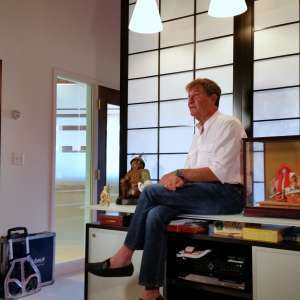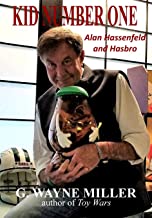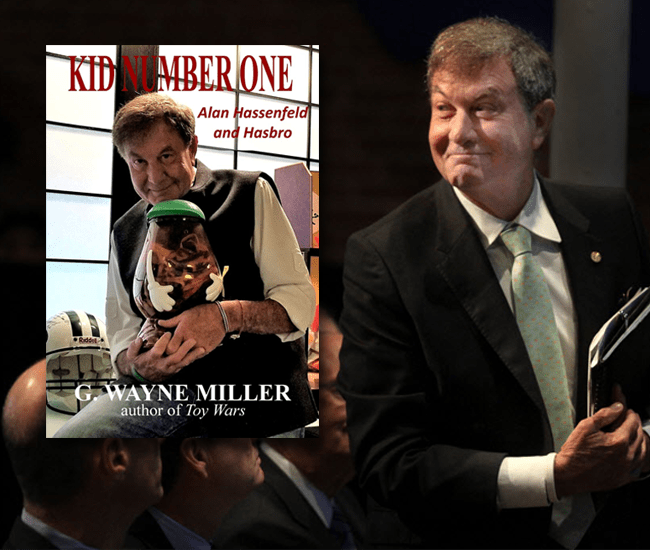Kid Number One by G. Wayne Miller, Alan Hassenfeld
Who can’t like a person who says his favorite toy growing up was Mr. Potato Head? And his most formidable adversary was Barbie? Add to that he’s committed to tikkun olam, a concept in Judaism which holds its believers responsible not only for their own moral, spiritual and material welfare, but also for the welfare of society at large. In short, a guy who believes it’s his job to help others.
Alan G. Hassenfeld is a third-generation Hassenfeld brother and much of the energy and spirit behind the toy company giant Hasbro. G. Wayne Miller, author of the true-life business suspense story Toy Wars, now brings us Kid Number One (Stillwater River Publications), a thorough narrative of the Hassenfelds, the toy conglomerate they built, and its abundance of international kindness. Hasbro is not just a manufacturer of games and toys. Miller’s latest book makes that clear.
The history of the company that brought us G.I. Joe, Transformers, My Little Pony, and of course Mr. Potato Head (or Pot Head, as Alan likes to call him) is a testament to an America fueled by immigrants. Driven from Europe as teenagers before the first World War, brothers Henry and Hillel Hassenfeld came to the U.S. fleeing societal unrest, unmitigated hatred and pogroms which slaughtered thousands of Jews. Like other Jews before them, they settled in the lower east side of Manhattan and struggled to make enough money to eat. Their first venture was rags. Literally, rags.
FROM RAGS TO MR. POTATO HEAD
How they got from rags to Mr. Potato Head is only part of the story. However, Kid Number One does have a textbook chronicle of Hasbro’s history, complete with stock prices, merger rumors, face-offs with Hasbro’s fiercest competition (Mattel, creator of the infamous Barbie), and painful stories of the toys that didn’t succeed.
If you’ve ever babysat for a stubborn but adorable toddler, you know that feeling of trying to find the one toy that will amuse him or her. You present toy after toy. Baby is initially intrigued, quickly uninterested, fractious, distracted—until finally you find the one toy Baby likes. He (or she) is delighted and fascinated for a while, but that too wanes, and it starts all over again. That is what the toy industry is like, but the Hassenfelds, their families, and their employees seem to be the best babysitters you could imagine. They set aside the toys that did not garner profits and present new ideas or re-invented old ones. Their perseverance wins out. For decades. For three generations. But the successes and failures of Hasbro is just part of the book.
There’s the family story, too, which is heartwarming—and sometimes sad—but this is a book about Number One Kid, after all, and when the focus hones in on Alan, we see what tikkum olan is all about.
NEVER WANTED TO RUN THE COMPANY – ANY COMPANY
 He never wanted to be CEO of anything, much less the family business. He was happy traveling the world and, frankly, having fun. But when it was necessary for him to be part of the company, grow with the company, build the company, he did so; and he found that he had a knack for it. Hasbro thrived.
He never wanted to be CEO of anything, much less the family business. He was happy traveling the world and, frankly, having fun. But when it was necessary for him to be part of the company, grow with the company, build the company, he did so; and he found that he had a knack for it. Hasbro thrived.
And so did Alan Hassenfeld. He found he could build a corporate atmosphere of ethical professionalism and familial loyalty while making enough profit to do what he wanted to do more than anything: spread goodness around the world.
Kid Number One, including author’s notes, is nearly 400 pages, and it takes that long to even start to do justice to the Hassenfeld brothers’ philanthropy. After the hurricane that devastated Puerto Rico, he flew doctors, nurses, and 11,000 pounds of food, water, clothes and medications to the ravaged island. He brought the sickest Puerto Ricans back to the mainland for treatment.
He helped build the Bamboo School in Thailand and provided scholarships for needy children. He supported the Mechai Viravaidya Foundation there, which worked to improve the lives of the people in remote rural villages. He helped refugees from Europe and Asia come start productive lives here in the U.S., supported the Afghan Women’s Development Centers, and established a Day of Global Joy at Hasbro where employees were encouraged to go do acts of charity.
HASSENFELD’S CROWN JEWEL
There’s more, but perhaps the jewel in the crown is the Hasbro Children’s Hospital in Providence, RI. Together with Dr. Edwin Forman, Associate Chief of Pediatrics at Rhode Island Hospital, Hassenfeld financed an architecturally designed building with children’s needs and imaginations as the focus, with room for families to stay with their children. “The hospital that toys built,” the press called it, and when it opened, Alan Hassenfeld was there with his top executives giving out toys and cookies.
The title of this book, Kid Number One, may sound like Hassenfeld has an overfed ego, but that couldn’t be further from the truth. Hassenfeld wouldn’t let any press cover the opening of the hospital, and when a child asked him if he was Mr. Hasbro, he said, no. But he worked for him.
Kid Number One is a business book, yes, but reading it will make you feel like there’s some good in this world. Maybe Alan Hassenfeld’s commitment to tikkun olam will inspire his readers to do a little good themselves.
Kid Number One is now available for purchase.
Learn more about Wayne on his Author Profile page.
For more on Wayne, please visit his website.
Buy this Book!
Amazon



